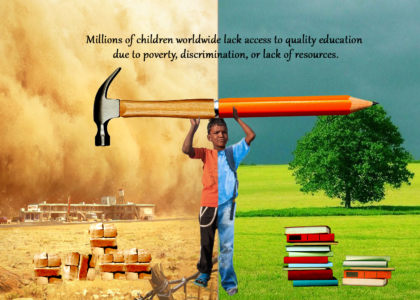Introduction

Education is a fundamental human right that has the power to transform the lives of individuals and entire communities. It is an essential tool for personal development, economic growth, and social progress. However, access to quality education is not universal, and many children worldwide are deprived of this basic right. The cost of education can be prohibitive for many families, leading to a cycle of poverty and limited opportunities. In this blog, we will explore the importance of education and how free education can change a child’s life.
The Importance of Education

Education is essential for personal growth, social development, and economic prosperity. It provides individuals with the knowledge, skills, and confidence needed to succeed in life. Education also plays a crucial role in promoting social equality, reducing poverty, and promoting sustainable development.
Children who receive a quality education are more likely to be healthy, productive, and engaged members of their communities. They are more likely to have better jobs, higher incomes, and improved health outcomes. Education also empowers individuals to participate in the democratic process and advocate for their rights.
Without education, children are more likely to face poverty, unemployment, and social isolation. This is particularly true for girls, who are often the first to be denied an education in many developing countries. Girls who are denied an education are more likely to be married off at a young age and are less likely to have access to healthcare, resulting in increased maternal and infant mortality rates. Educating girls is therefore not only a matter of justice, but it is also a matter of public health.
Unfortunately, millions of children worldwide are deprived of their right to education. Poverty, conflict, and discrimination are key factors preventing children from accessing quality education. In many countries, education is not free, and families cannot afford the costs of tuition, uniforms, and textbooks.
How Free Education Can Change a Child's Life

An effective instrument for fostering social change is free education. It can end the cycle of poverty, give people more control over their lives, and stimulate the economy. Here are some of the ways in which free education can change a child’s life:
- Free Education: Children from underprivileged homes may have greater access to school thanks to free educational programs. It can provide kids the chance to go to school, pick up new skills, and be ready for a brighter future.
- Reduced Financial Burden: Numerous families struggle to pay for the price of tuition, uniforms, and textbooks since education may be costly. Free education programs can ease the financial strain on families while ensuring that all kids have access to a high-quality education.
- Quality Education: Programs for free education can also raise the standard of instruction. It can guarantee that educational institutions have the tools, qualified faculty, and appropriate facilities needed to deliver high-quality instruction.
- Poverty Reduction: A key factor in lowering poverty is education. It equips people with the information and abilities needed to land better jobs and earn more money. In turn, this can contribute to lowering poverty rates and raising living standards.
- Increased Gender Equality: Programs for free education can help advance gender equality. Due to cultural norms and economic constraints, girls are much more likely to be excluded from educational opportunities. Free education initiatives can aid in making sure that girls and boys have equal access to high-quality education.
It is important to note that free education is not just a matter of providing access to schools and teachers. Quality education is equally important. Children need access to well-trained teachers, appropriate learning materials, and a supportive learning environment to fully realize the benefits of education. Governments and stakeholders must work together to ensure that quality education is accessible to all children, regardless of their background or socio-economic status.
Conclusion

A fundamental human right, education is crucial for fostering individual development as well as societal and economic progress. However, poverty, violence, and prejudice globally deprive millions of children of this fundamental right. Free educational opportunities may break the cycle of poverty, give people more power, and stimulate the economy. It can increase access to education for kids, ease the financial strain on families, raise educational standards, lessen poverty, and advance gender equality. Therefore, it is crucial to give free education programs top priority to guarantee that all kids can attend high-quality education and get ready for the future.




